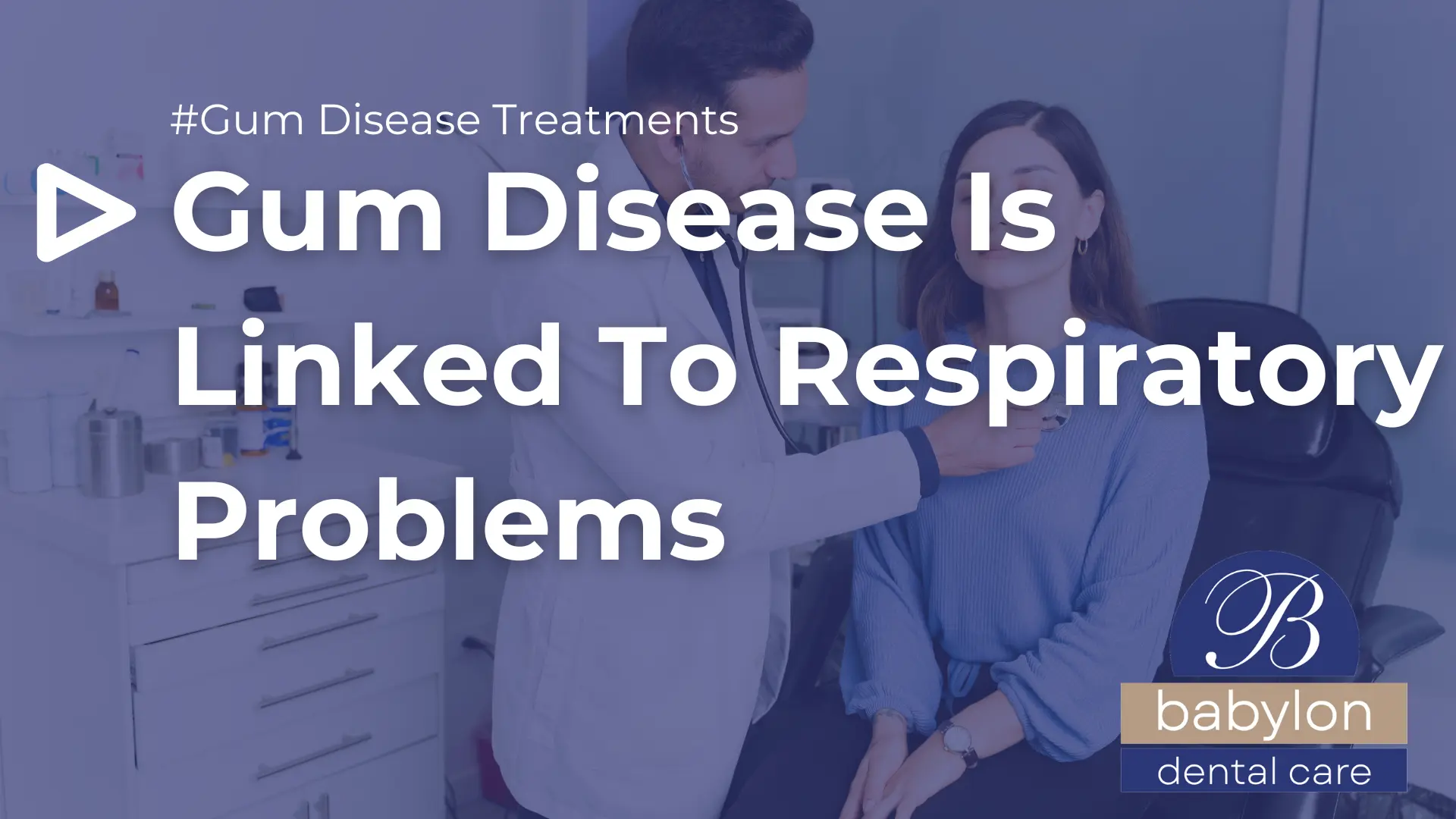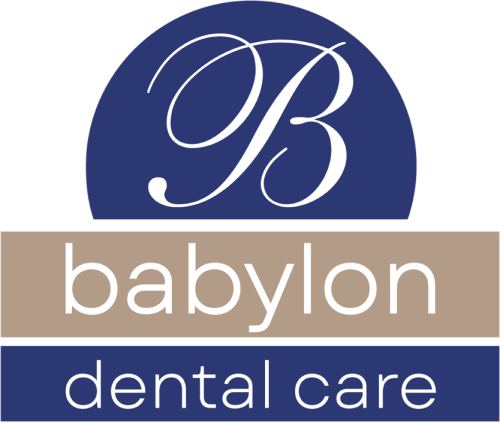
Studies have shown gum disease (periodontal disease) can lead to certain respiratory conditions. Researchers discovered that people with gum disease could experience worsening symptoms of chronic obstructive pulmonary disease (COPD) and even develop bronchitis, emphysema, or pneumonia.
The bacteria responsible for causing gum disease can make their way into a person’s lungs when they inhale, leading to respiratory infections. The inflammation that occurs damages the respiratory system and increases the risk of developing various illnesses of the lungs, air sacs, and other internal structures. Periodontal disease treatment from Babylon Dental Care can diminish your risk of infection from gum disease.
What Is Periodontal Disease?
 Periodontal disease develops when a bacterial infection in the mouth causes gum inflammation (gingivitis). If food or plaque becomes trapped between the bottom of the teeth and the gums, infections can form. Without proper dental care, the bones supporting the teeth and soft tissue become seriously damaged, leading to tooth loss.
Periodontal disease develops when a bacterial infection in the mouth causes gum inflammation (gingivitis). If food or plaque becomes trapped between the bottom of the teeth and the gums, infections can form. Without proper dental care, the bones supporting the teeth and soft tissue become seriously damaged, leading to tooth loss.
Common symptoms of periodontal disease include:
- Bad breath
- Puffy or swollen gums
- Tender gums
- Pain while chewing
- New spaces between the teeth
- Purplish, red, or dusky red gums
- Spitting out blood when flossing or brushing teeth
- Loose teeth or loss of teeth
- Gums that bleed easily
- Pus between the gums and teeth
- Receding gum line
A range of factors can increase a person’s risk of developing gum disease, including:
- Crooked teeth
- Chewing or smoking tobacco
- Certain medications, such as oral contraceptives, steroids, and chemotherapy drugs
- Genetics
- Damaged fillings
- A poorly fitting dental appliance
- Pregnancy
- Compromised immune system due to conditions, such as HIV and AIDS
- Diabetes
If you’re experiencing any symptoms of periodontal disease, you should schedule an appointment with your dentist immediately. Your dentist can perform an oral examination and take X-rays to determine whether you have gum disease.

Common Types of Respiratory Diseases
The respiratory system contains numerous tissues and organs that work together to allow a person to breathe. The system cleans out waste, such as carbon dioxide, and absorbs oxygen from the air. Inflammation, infections, and other issues can affect vital parts of the respiratory system, leading to serious medical conditions.
The most common types of respiratory diseases and their symptoms are below.
Chronic Obstructive Pulmonary Disease (COPD)
COPD is a chronic disease of the lungs, restricting airflow from the lungs. The most common symptoms of COPD include:
- Wheezing
- Lack of energy
- Chest tightness
- Shortness of breath, especially during physical activity
- Swollen feet, ankles, or legs
- Chronic cough that can produce white, yellow, clear, or greenish mucus
- Frequent infections of the respiratory system
- Unintended weight loss
Emphysema
Emphysema is a form of COPD that develops when there’s damage to the air sacs in the lungs. The most common symptoms of emphysema include:
- Producing a lot of mucus when coughing
- Chest tightness
- Frequent wheezing or coughing
- Shortness of breath, especially when physically active
- Squeaky or whistling sound while breathing
Acute and Chronic Bronchitis
Bronchitis develops when the tubes carrying air in the lungs become inflamed and produce too much mucus.
Acute bronchitis often results from a viral infection but can also occur when there’s a bacterial infection. Long-term airway irritation typically causes chronic bronchitis.
The most common symptoms of bronchitis include:
- Fever
- Shortness of breath
- Frequent mucus-producing cough
- Wheezing when breathing
- Lack of energy
Asthma
Asthma causes narrowing of the airways, which makes it difficult to breathe. The most common symptoms of asthma include:
- Chest pain or tightness
- Wheezing while exhaling
- Shortness of breath
- Wheezing or coughing attacks
- Difficulty sleeping due to coughing, shortness of breath, or wheezing
The Connection Between Gum Disease and Respiratory Problems
There are multiple factors linking gum disease to the development of respiratory illness. The most common include:
- Inflammation – Oral tissue becomes inflamed and irritated when periodontal disease is present. The bacteria that cause tissue inflammation could also cause inflammation of the lining of the lungs. When the lungs become inflamed, it’s more difficult for air to move from and to the lungs.
- Spread of bacteria – When a person with periodontal disease breathes in, they can inhale the oral bacterium present in their mouth. The bacteria then enter the lungs, resulting in inflammation and respiratory problems, such as bronchitis.
- Low immune system – It’s common for someone suffering from persistent or chronic respiratory illnesses to have a poor immune response. A weakened immune system means bacteria can enter and grow below the gum line without the body fighting off an attack. An increased amount of oral bacteria means an accelerated progression of gum disease, leading to pneumonia, COPD, or emphysema.
Prevent Respiratory Problems by Practicing Good Oral Hygiene
 The first line of defense in preventing periodontal disease and the complications that can arise from the disease is maintaining your oral health. You can keep your teeth and gums healthy by brushing twice a day. You should also floss to remove any food debris left behind that your toothbrush can’t reach.
The first line of defense in preventing periodontal disease and the complications that can arise from the disease is maintaining your oral health. You can keep your teeth and gums healthy by brushing twice a day. You should also floss to remove any food debris left behind that your toothbrush can’t reach.
It’s crucial to visit your dentist for routine checkups and cleanings. Your dentist can get to those hard-to-reach places and remove plaque and tartar buildup. Taking X-rays is another preventative measure that can be used to discover any issues your dentist needs to address.
If you were already diagnosed with gum disease or noticed any of the symptoms, you should discuss them with your dentist. A thorough exam can determine whether you have periodontal disease. Your dental professional can recommend an appropriate treatment plan to improve your oral health.
Periodontal Disease Treatment Options
Multiple treatments are available to reverse the effects of gum disease and prevent additional blood vessel, gum, and bone damage from occurring.
The most common treatments for gum disease include:
- Root planing – Smoothing the root’s surface under the gums can prevent further tartar and bacteria buildup. It can also reattach the surface of the teeth to the gums to prevent food from getting trapped in the spaces and causing inflammation.
- Antibiotics – A topical or oral antibiotic can help fight off bacterial infections in the gums.
- Surgery – A surgical procedure might be the most effective option to repair damage to your bones, soft tissue, and other structures in and around the gums.
- Scaling – A laser, ultrasonic device, or another scaling instrument can remove tartar and bacteria from the areas below the gum line and on the surface of the teeth.
Contact Babylon Dental Care
If you want to discuss possible options to treat gum disease and reduce your risk of developing respiratory problems with the proper preventative dental care, contact Babylon Dental Care immediately.
Our team of professionals will provide the comprehensive services you need to maintain your oral health. Call us at (631) 983-6665 today for an appointment.
